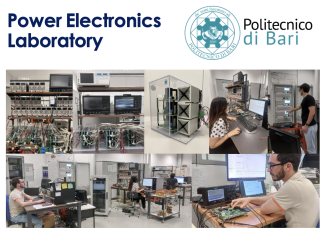Power Electronics Laboratory (PELS Lab)
The Power Electronics Laboratory deals with innovative, efficient and reliable systems for the conversion of energy from renewable sources and innovative, efficient and reliable systems for the electrification of different means of transport.
MODULAR CONVERTERS - The high efficiency operation of power electronic converters is essential to enable their large-scale diffusion both in grid applications and in the electrification of means of transport. Modular converters are a family of power electronics converters increasingly used in high voltage and high power applications for their many advantages, such as the use of low voltage semiconductor technology instead of high voltage modules (less efficient and widespread) and modularity, which is directly associated with scalability, redundancy, fault-tolerant operation and ease of maintenance. Within the MMCC family of modular converters, two architectures are of particular interest to the research group due to their remarkable potential, namely the modular multilevel converter (MMC) and the cascaded H-bridge converter (CHB). The research group is working on advanced modulation and control techniques to improve efficiency, stability and reliability of such converters.
HIGH-FREQUENCY CONVERTERS - In the field of high-speed electric drives, the use of inverters with Wide-Bandgap Devices (SiC MOSFET and GaN HEMT) represents a solution that allows an improvement of the converter efficiency. The introduction of high switching frequency devices with SiC MOSFET or GaN HEMT technology leads to the emergence of several issues, especially related to the considerable stresses imposed on the insulation systems by the sudden voltage variations, reducing the reliability of the system. The research group is working on innovative software and hardware solutions to address these issues.
